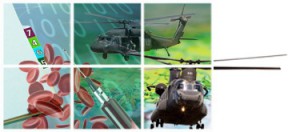The TraceLogic initiative is developing methods, processes, and algorithms to decipher the hidden rules or logic of complex flight operations aboard Navy aircraft carriers. The TraceLogic technology will help the Navy to better understand and address the technical and pragmatic problems associated with improving flight operation performance.
Operations on aircraft carriers have been described as “controlled chaos” that involve a complex, choreographed mix of flight-mission preparations, launch, recovery, and mission close-out operations. Critical activities take place on the hangar deck, the flight deck, and in the control center and these activities are performed by personnel with distinct roles, using mobile and fixed equipment, ordnance, and fuel. Missions are often in flux, and a single equipment failure can throw the entire plan of action into a tailspin.
Complex organizational systems—including aircraft carrier flight operations—must adapt and learn: they don’t operate strictly on rules but rather on high-level guidelines. This structure makes for the most effective response to novel, critical situations and the addition of new weapons systems like unmanned aircraft. To maximize the ability of these well-trained carrier operations teams to optimally and quickly adapt to changing Navy aviation capabilities and conditions, KBSI is developing methods, processes, and algorithms to decipher the hidden rules or logic of the complex traffic patterns involved; i.e., Automated Rule Learning from Data Traces (TraceLogic).
 The TraceLogic initiative will generate trace data from aircraft simulations and via sensor based data acquisition. Although efforts have been made to model carrier flight operations, none have yet been able to accurately capture the rules of operations. These rules are made up of the constraints imposed by the carrier configuration and crew demands and, in part, by the dictates of the dynamic mission and operational scenario requirements. While the Office of Naval Research has funded a number of projects with the goal of developing a simulation-based carrier flight deck operations management tool, capturing these rules, given the huge number of dynamic variables involved, has proven especially difficult. Finding a means of capturing both motion traces and states of aircraft, equipment, personnel, and material and then analyzing that data to generate the rule sets is an important goal of the TraceLogic initiative.
The TraceLogic initiative will generate trace data from aircraft simulations and via sensor based data acquisition. Although efforts have been made to model carrier flight operations, none have yet been able to accurately capture the rules of operations. These rules are made up of the constraints imposed by the carrier configuration and crew demands and, in part, by the dictates of the dynamic mission and operational scenario requirements. While the Office of Naval Research has funded a number of projects with the goal of developing a simulation-based carrier flight deck operations management tool, capturing these rules, given the huge number of dynamic variables involved, has proven especially difficult. Finding a means of capturing both motion traces and states of aircraft, equipment, personnel, and material and then analyzing that data to generate the rule sets is an important goal of the TraceLogic initiative.
The results of the TraceLogic initiative, in addition to helping the Navy improve their on-board carrier operations, will contribute to researchers’ understanding of complex adaptive systems and the discrete event technology base. The TraceLogic methods, processes, and algorithms that convert trace data from complex systems will expand the possibilities for adaptive systems, and the initiative’s distributed sensor architecture design will help enable the measurement and monitoring of complex operational spaces.
